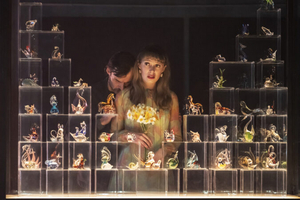Review: THE GLASS MENAGERIE, Duke Of York's Theatre
Amy Adams makes her West End debut in a dumbed-down production of Tennessee Williams's masterpiece.
|

![]() Whether it's all a big scheme to get bums on seats or these actors are suddenly genuinely interested in being in plays, it's working. The West End is swarming with film and tv stars at the minute and patrons are flocking to see them.
Whether it's all a big scheme to get bums on seats or these actors are suddenly genuinely interested in being in plays, it's working. The West End is swarming with film and tv stars at the minute and patrons are flocking to see them.
Eddie Redmayne and Jessie Buckley were the first names to open up Theatreland last year, while Jonathan Bailey had prices for Cock go up to £400 a few weeks ago; Jodie Comer sold out Prima Facie immediately, and Tom Felton's being successfully spooky in 2:22. But all that glitters isn't gold.
Now, six-time Oscar nominee megastar Amy Adams makes her West End debut digging into Tennessee Williams's The Glass Menagerie. The 1944 play is what propelled Williams away from obscurity and turned him into a theatrical phenomenon, but this take is watered down and distinctly lacks atmosphere.
Tom (Paul Hilton as the older, unreliable narrator of the story) recounts his suffocating upbringing in the American South. His mother Amanda (Adams) is oppressive and debilitatingly patronising. Abandoned by her husband and in a difficult financial position, she's grown resentful and scornful towards her children.
Her toxic reminiscences as a faded Southern Belle place harrowing pressure on Laura (Lizzie Annis), her fragile daughter who suffers from a colossal inferiority complex other than a limp. The titular glass menagerie - here lit up ominously and despised by her mother - is Laura's own little world and her only escape.
Her brother Tom (Tom Glynn-Carney in the flashback) is a snappish, restless young man who's endlessly frustrated by his job and dreams of being a poet. As the breadwinner, he feels obliged to shoulder his thankless family's burdens but burns with a desire to leave everything behind.
Jeremy Herrin takes Williams's own creation, "plastic theatre" (by definition, it uses imagery, objects, the lot as metaphors), and runs with it. A great tool, unless it's done to excess with one-size-fits-all symbolism.
Herrin's vision results in excellent performances from the cast but a dumbed-down production. Paul Hilton's older, slightly more eccentric Tom seems to be giving a lecture in what looks like a bunker of sorts. As his memories de-crystallise and his narration takes form before him, his family members become characters in his tale.
He is a facilitator for the performance, handing props, nodding in agreement, or joining his younger self's crushing emotions. Black blocks cover the upper part of the space as designed by Vicki Mortimer; they press down on the stage, turning it in a messy sliver.
Projected images appear on the hanging backdrop during specific fragments. They don't add anything to the portrayals, and actually distract the audience from the striking acting work happening underneath them. They're dreamy and kaleidoscopic fire escapes, neon-lit alleys, and misshapen versions of Laura's cherished trinkets seen as if distorted by glass, but unnecessary.
There's a lot going on on the sides as well. Music is being played live on one end while the opposite hosts a number of lamps of various sizes and desks where the actors amiably wait their turn. Nick Powell's music, too, feels like a gimmicky addition whose use comes off as arbitrary in the long run.
Oversaturated neon lights and a microphone feature without much sense and a modern table that almost looks 3D-printed visually confuses the time period further. All this window dressing dwarfs the action and displays a lack of trust in both text and performers.
The set-up is altogether unclear. The play-within-a-play gives a certain awareness that the characters are performing under the direction of Hilton's Tom and solely for his benefit while he is also retelling the whole story to the audience. All in all, the framing is too puzzling for its own sake and falls flat.
With her name appearing bigger than both title and playwright on the poster, Adams is obviously the top-billed star. However, she is surrounded by finer performances than her own. She is a minimalist in her imperiousness and cinematic in her poise, too much so, and ends up stifled by the other's theatrical confidence.
Her Amanda is composed and haughty as she hides a short fuse behind perfect propriety. If looks could kill, Tom would be dead a thousand times over, but looks are all they are. Glynn-Carney is exuberant and theatrical in his frustration and impudence. This restlessness is mirrored by the regret in Hilton's longing and wistful stares at his younger self.
Victor Alli's Jim O'Connor has the mannerism of a politician and the cadence of a consummate salesman. He might be self-assured and sweet-talking, but he's as much a has-been as Amanda. The real revelation is Lizzie Annis, who makes an impressive stage debut as the sheepish and insecure Laura.
She is heart-wrenching in her naivety and artlessness, delivering her character's hyper-focus on the glass animals with potency and sincerity. Her heartbreak comes as stunned silence and a fleeting, sombre smile. All these great interpretations feel, sadly, rather misplaced.
If we strip the piece of its surplus of visual and auditory stimulations and keep only the superb contributions from the actors, this take on Williams's masterpiece would be very close to being a five-star production. Regretfully, it's barely a glassy three.
The Glass Menagerie runs at the Duke of York's Theatre until 27 August.
Photo credit: Johan Persson
Videos
